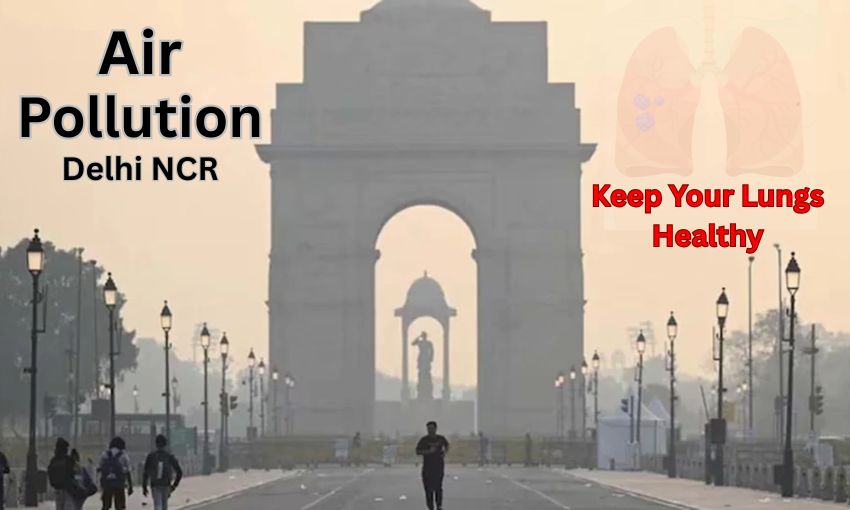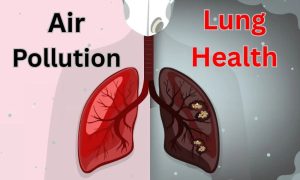Introduction
Every winter, Delhi NCR wakes up under a thick layer of grey smog that blurs the skyline and fills the air with an acrid smell. The air pollution in Delhi NCR becomes so severe that breathing feels like inhaling smoke. Schools close, flights get delayed, and the Air Quality Index (AQI) reaches hazardous levels. Sadly, the real victims are our lungs.
The causes of air pollution in Delhi NCR are complex — from vehicle emissions and industrial waste to stubble burning in nearby states. This pollution triggers breathing difficulties, chronic cough, asthma attacks, and long-term respiratory issues. Understanding the factors responsible for air pollution in Delhi NCR and taking personal steps to protect your lungs can make a huge difference to your health and that of your family.
In this detailed guide, we’ll explore the reason for air pollution in Delhi NCR, its effects on respiratory health, and practical ways to safeguard your lungs.
Understanding Air Pollution in Delhi NCR
1. What’s Happening in the Air?
The air pollution in Delhi NCR today is a mix of fine particulate matter (PM2.5 and PM10), nitrogen dioxide, sulfur dioxide, carbon monoxide, and ozone. These pollutants are microscopic particles that penetrate deep into your lungs, causing inflammation and irritation.
According to environmental reports, the AQI in many areas of Delhi and NCR crosses 400 during winter — a level considered “severe.” This level of pollution affects even healthy individuals and can be especially harmful for people with pre-existing respiratory problems due to pollution.
Major Causes of Air Pollution in Delhi NCR
Understanding the causes of air pollution in Delhi NCR helps us act smarter. Some of the top factors responsible for air pollution in Delhi NCR include:
-
Vehicular Emissions: Delhi has millions of vehicles, many running on diesel or petrol, releasing harmful gases.
-
Industrial Pollution: Factories located in and around NCR emit toxic fumes and particulate matter.
-
Stubble Burning: During harvest season, farmers burn crop residue in Punjab and Haryana, adding massive smoke clouds to the NCR atmosphere.
-
Construction Dust: Rapid urban development contributes to fine dust particles that worsen breathing problems in Delhi.
-
Winter Weather Conditions: Low wind speed and temperature inversion trap pollutants close to the ground, leading to dense winter smog Delhi NCR.
All these factors responsible for air pollution in Delhi NCR combine to make the city’s air one of the most polluted in the world.
Impact of Air Pollution on Lungs
Air pollution and lungs have a direct connection. Breathing polluted air for long periods can lead to:
-
Chronic Cough and Throat Irritation
-
Asthma and Pollution-Related Attacks
-
Bronchitis and Wheezing
-
Decreased Lung Capacity
-
Increased Risk of COPD (Chronic Obstructive Pulmonary Disease)
-
Higher Chances of Lung Cancer
People with weak immunity, seniors, and children are more vulnerable. Many residents now consult a Chest Physician or a pulmonologist in Delhi NCR during the smog season for early management of respiratory problems due to pollution.
How to Protect from Air Pollution in Delhi NCR
Here are some easy, actionable steps on how to protect from air pollution and keep your lungs safe:
1. Monitor Air Quality Daily
Check AQI updates using reliable apps. Avoid outdoor exercise or travel when air pollution in Delhi NCR today is in the “severe” category.
2. Use N95 Masks
A good-quality mask can block up to 95% of fine particles. It’s a must during winter smog Delhi NCR.
3. Air Purifiers at Home
Air purifiers help reduce indoor pollution levels. They’re especially important for kids, elderly, and asthma patients.
4. Strengthen Immunity
A diet rich in vitamin C, omega-3, and antioxidants can help your body fight air pollution and lungs damage.
5. Steam and Lung Detox
Inhaling steam or practicing breathing exercises can help in lung detox after pollution exposure.
6. Indoor Plants
Plants like snake plant, aloe vera, and peace lily naturally clean the air and improve oxygen levels indoors.
7. Avoid Smoking
Smoking adds more toxins to already polluted air and worsens breathing problems in Delhi.
8. Stay Hydrated
Drinking plenty of water helps your body flush out toxins that accumulate due to air pollution in Delhi NCR.
When to See a Pulmonologist
If you experience persistent coughing, wheezing, or shortness of breath, it’s time to see a pulmonologist in Delhi NCR. Early diagnosis can prevent long-term damage. Leading hospitals provide expert care through their Chest Physician and respiratory medicine departments. You can consult the best hospital for respiratory care Delhi NCR for chronic conditions like asthma, bronchitis, or COPD.
Treatment and Recovery
Chronic Cough Treatment
If you’ve developed a stubborn cough due to smog exposure, visit a specialist for chronic cough treatment. Avoid self-medicating; professional help ensures safe recovery.
Asthma and Pollution
For people with asthma, pollution acts as a major trigger. Regular check-ups, inhaler use, and lifestyle adjustments can help manage asthma and pollution effectively.
Lung Detox After Pollution Exposure
Post-smog, your lungs need extra care. Here’s how to perform a natural lung detox after pollution exposure:
-
Practice deep breathing (pranayama).
-
Eat detoxifying foods like ginger, turmeric, and green vegetables.
-
Use air-purifying plants indoors.
-
Get enough rest and stay hydrated.
Simple daily habits can go a long way in maintaining respiratory health even in polluted conditions.
Conclusion
The air pollution in Delhi NCR is not going away soon, but you can still protect yourself. Awareness, timely precautions, and proper medical care can minimize the impact on your lungs. Visit a Chest Physician or pulmonologist in Delhi NCR if you notice any breathing problems in Delhi during winter.
Your lungs deserve as much care as your heart — don’t wait until the smog settles to take action. By understanding the causes of air pollution in Delhi NCR and acting early, you can ensure a healthier, cleaner, and safer life for you and your loved ones.
10 Frequently Asked Questions (FAQs)
1. What are the main health effects of winter smog on the lungs?
Winter smog Delhi NCR can cause coughing, throat irritation, asthma attacks, and decreased lung capacity. Prolonged exposure increases the risk of chronic bronchitis and other respiratory diseases.
2. How can I protect my children from respiratory problems caused by Delhi’s smog?
Limit outdoor activities during high pollution days, use air purifiers at home, and make them wear N95 masks outside. Encourage them to eat antioxidant-rich foods that support lung health.
3. What are the early symptoms of pollution-related lung issues?
Early signs include cough, shortness of breath, chest tightness, and fatigue. If these persist, visit a Chest Physician or pulmonologist in Delhi NCR.
4. When should I consult a pulmonologist for breathing problems during winter?
If your cough lasts more than two weeks, or you feel wheezing or chest pain, consult a pulmonologist in Delhi NCR immediately. Early intervention helps prevent chronic damage.
5. Can air purifiers and masks really help against pollution in Delhi NCR?
Yes. N95 masks block most harmful particles, and air purifiers reduce indoor pollutant levels significantly. They are essential during air pollution in Delhi NCR today.
6. What are the top reasons for air pollution in Delhi NCR?
The main reason for air pollution in Delhi NCR includes stubble burning, vehicle emissions, industrial fumes, and construction dust.
7. Is it possible to completely avoid breathing problems in Delhi during winter?
You can reduce the risk but not eliminate it entirely. Follow protective measures, avoid outdoor workouts, and strengthen your immune system.
8. Which is the best hospital for respiratory care in Delhi NCR?
Many hospitals offer expert care, but the best hospital for respiratory care Delhi NCR has specialized pulmonology departments with experienced doctors and advanced diagnostic tools.
9. How does asthma worsen due to pollution?
Asthma and pollution are closely linked. Polluted air irritates the airways, leading to more frequent asthma attacks and breathing issues.
10. How can I naturally detox my lungs after pollution exposure?
Perform deep breathing exercises, stay hydrated, eat healthy, and include herbal teas and turmeric in your diet for a safe lung detox after pollution exposure.


